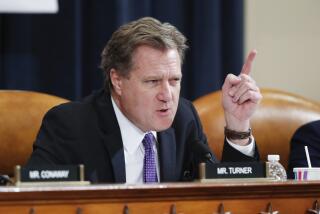Bush Still Sees Potential Threat From Soviets
- Share via
WASHINGTON — President Bush, criticizing what he called the continuing “euphoria” over political reforms in the Soviet Union, said Friday that the dramatic changes have led some to underestimate the potential threat to U.S. national security still posed by the Soviets.
“I know there’s almost a euphoria in some quarters that there’s no risks in the world anymore. Well, I don’t believe that,” said Bush, who meets next week with Soviet Foreign Minister Eduard A. Shevardnadze.
Although welcoming the increased political openness and economic restructuring spearheaded by Soviet President Mikhail S. Gorbachev, Bush said he believes that it is not yet time to relax the role of the North Atlantic Treaty Organization.
“I’m like the guy from Missouri--show me,” the President said at a news conference for non-Washington reporters.
Nuclear Arsenal Cited
Stating that “we have a very realistic approach to the Soviet Union,” Bush told the reporters:
“If you look at the Soviet Union modernizing its nuclear arsenal at a rather ferocious pace, I’m prudent enough to say: ‘Why, what’s happening here? Why are they doing this? Why--if it’s all euphoria and everything is rosy and nobody has anything to worry anymore about--how come?’ And so, let’s not let down our alliance guarantees because we are more optimistic about peace.”
The President said he looks forward to his meeting at the White House with Shevardnadze on Thursday and the subsequent talks in Wyoming between Secretary of State James A. Baker III and the Soviet foreign minister.
Even so, he said, he is not interested in gambling on the outcome of the U.S.-Soviet efforts to reduce their arsenals “by making universal cuts in our commitment to a strong NATO.”
During the news conference, the President said also that he does not think mass slayings such as Thursday’s rampage by a disturbed printing plant worker in Louisville, Ky., justify a federal ban on private ownership of semiautomatic assault weapons.
“I don’t think banning weapons is going to be the ultimate answer, or could ever safeguard against that kind of tragedy,” the President said, responding to renewed demands for tougher gun control legislation.
The President’s remarks on gun control reflected his adamant opposition to any move to limit ownership of semiautomatic assault weapons, which have become a central element in the arsenal of drug traffickers. The Administration has banned imports of all such weapons, but it has allowed domestic production to continue.
In the Louisville shooting, an emotionally disturbed man identified as Joseph T. Wesbecker roamed through a printing plant where he had worked and opened fire with an imported AK-47 assault rifle. He killed seven people and wounded 15 before fatally shooting himself.
Bush, asked why “we allow people to get hold of these weapons” and what he would tell the relatives of the victims, said:
“I would tell them that we must do everything we can to enforce laws that are already on the books . . . . I would tell them I don’t think banning weapons is going to be the ultimate answer, or could ever safeguard against that kind of tragedy.”
Under Kentucky law, possession of such weapons requires purchasers to sign a statement affirming that they have no criminal record. Wesbecker had none, it was reported.
“If you have somebody that is deranged, and I don’t want to prejudge this poor soul but, if he was deranged, I’m afraid you’re going to have incidents like this,” the President said.
“And it is terrible and the loss of life is horrible, but I have seen no evidence that a law banning a specific weapon is going to guard against it. So my view is--do everything you can in terms of education, do everything you can in terms of enforcing your laws that are on the handbooks.”
The President recounted an incident from “back in the ‘60s,” when he was a congressman from Texas and had sought to register his “arsenal” of weapons at the District of Columbia police headquarters.
“The guy looked at me like I had lost my mind,” Bush said. “I had a .22 and a .410 . . . and gave them the serial numbers.” A .22 is a small-caliber rifle and a .410 is a small-gauge shotgun.
The President said he asked the police officer if criminals were turning in their guns too.
“ ‘No, it’s a bunch of suckers like you from Northwest Washington,’ ” Bush said he was told. Northwest Washington is the wealthiest quadrant of the city.
“It made a profound impression on me,” Bush recalled.
The President sought also to respond to criticism that his anti-drug program will fail without greater expenditures funded by a tax increase.
“That’s the answer of the cynics . . . the ‘reflex critics’ that say the first time out of the box: ‘Raise taxes,’ ” Bush said. But he said he would not criticize a state or municipality that increased taxes to fund its own anti-drug operations.
And, he said, “serious and active consideration” is being given to suggestions, which he raised in the presidential campaign last year, that under-used or closed military bases could house prisoners for whom there is not sufficient space in municipal or state institutions.
More to Read
Get the L.A. Times Politics newsletter
Deeply reported insights into legislation, politics and policy from Sacramento, Washington and beyond. In your inbox three times per week.
You may occasionally receive promotional content from the Los Angeles Times.










